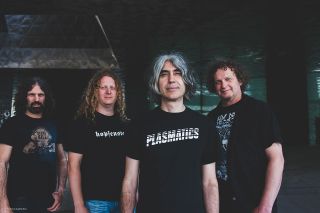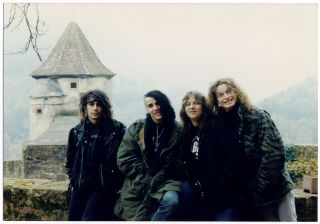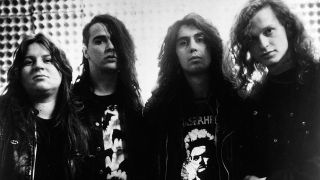Voivod drummer Michel ‘Away’ Langevin has a confession: “Van der Graaf Generator are my favourite progressive band.”
The secret’s out now. The man who has helped to steer one of the pioneering prog metal bands has a passion for Peter Hammill and his cohorts. But then again, as Away explains, it’s not surprising that he loves prog.
“I am from Quebec, and when I was growing up, there was such a thriving prog scene,” he explains. “We had a load of excellent local bands around, and thankfully a lot of the albums they recorded have been made available again. There was a time when the only way I could get records done by any Quebec bands was in Japan. Now, they’re easier to buy, and there was some incredible music done in those days. I am talking about the 1970s.”
Away first got into prog by listening to it on the radio.
“I heard the usual bands like Genesis, Supertramp and Pink Floyd. Then I discovered Gentle Giant, King Crimson and, especially, Van der Graaf Generator. It opened up a whole new world for me.”
However, the area of prog to make the biggest impression on the young drummer was Krautrock. He was introduced to this style by late Voivod guitarist Denis ‘Piggy’ D’Amour.
“He had a big collection of vinyl from these sort of bands,” says Away. “And it really amazed me. I loved the way they combined contemporary classical music influences with an experimental rock approach. I have to say that was a big inspiration for what we went on to do in Voivod.”
If you listen to the band’s debut album, 1984’s War And Pain, you would never have believed that later that decade this band would come up with a sound that was challenging and adventurous. War And Pain is a raw, primitive record with little of the progressive aspects that later became their motif.

“That’s because, with the exception of Piggy, who was already a really good guitarist, none of the rest of us [bassist Jean-Yves ‘Blacky’ Thériault and vocalist Denis ‘Snake’ Bélanger] were good enough to play anything even remotely complex,” Away explains. “All we could do was follow a much more punk, hardcore and metal approach. The New Wave Of British Heavy Metal gave us the inspiration to go out and make our own music. But we never forgot about the prog bands who we had grown up listening to. It’s just that back then, there was no way we could attempt anything like that.”
While there was definitely some forward movement on second album Rrröööaaarrr (1986), there was still little sign of what was to come.
“We were in the process of finding our feet musically, and getting to grips with what we were doing. I wouldn’t say there was a real leap forward for us artistically until our third album.”
That was 1987’s Killing Technology, by which time Voivod were confident in what they were doing. They began to take creative risks, exploring territory that was alien to almost every other young underground metal act with whom they were compared.
“We always understood we were different to most of them,” muses Away. “The problem was that we were always touring with these guys. And therefore were regarded as part of the thrash scene. But while this was fine for others, to us this was narrowing. When we were in the studio for Killing Technology, we started to develop ideas which were going off in different directions. All four of us were no longer prepared to be in a straight metal band. Harris Johns, our producer, encouraged us to be a little more psychedelic, and we enjoyed what happened. This was the band stepping up and proving we were now good enough as musicians to be a lot more bold, and follow our own beliefs.”
However, one thing Away is determined to highlight is that Voivod never had a grand blueprint for the way they wanted to create a legacy.
“We never sat down and mapped out the path down which our career should go. We didn’t say, ‘Right, let’s make the first album very hardcore and punk, then become more metal and thrashy on the second one, and move towards psychedelia on the third.’ We weren’t clever enough to think ahead in that way. What happened was natural and unforced. It was just that, as we became a better band, it seemed logical for us to go back to our progressive roots, and start to get a lot more of those influences into the music we knew we were now capable of making.”
Voivod sounded unlike any other band of the period. While you can hear various inspirations, especially the off-kilter manner of Van der Graaf, at no point can you isolate anything they were doing and claim it was directly connected to any one artist.
“I think a lot of that came from the fact that we grew up in a remote part of Quebec [Jonquière],” says Away. “So to a large extent we were cut off from the mainstream rock culture. We had nobody local to emulate or follow, and felt we had to come up with our own style. No one told us what to do, or how to do it. We were allowed to become a band who had instincts, and were never under pressure to limit anything we tried. So, when we got to Rrröööaaarrr and were now able to think of trying different time signatures and generally more interesting musical stuff, our background gave us the boost just to go ahead and see what happened. Had we lived in a big city, it’s possible we would never have been daring enough to try something like this. Being on our own did have that advantage. And we have never lost the desire to keep on improvising and improving.”
In those formative times, the band were signed to Noise Records, a German label renowned for a roster of underground metal. Did they ever try to curb Voivod’s more prog excesses?
“No, we were very lucky with them. They signed the band, and then left us to get on with what we wanted to do. At no time did they interfere musically. Nor did they try to change the artwork we wanted on the album covers [Away is also the artist for Voivod’s album sleeves]. They seemed almost proud that we were different to anything else on the label. I assume our sales were good enough for them to believe we had the right idea. Why alter what was clearly working in their favour?”

Voivod, however, were touring in the 80s with a lot of bands who were clearly unsuited to them.
“We were going out on the road with other bands on the Noise label. But many of them were just not even close musically to us,” Away remembers. “On the surface, we had much in common. But while we always had some metal in our music, as time went on we were moving more and more away from that type of thing, whereas these bands were very much at the centre of the whole scene.
“It did create some problems for Voivod. Audiences didn’t know what to make of us at all. Some fans would get what we were doing, and loved it. But there were times when we were jeered at during a set by those who wanted to hear straight-ahead metal. All they’d like us to have done is to play what we did on War And Pain, and nothing else.”
In an effort to get around this problem, Voivod began to organise their own festivals in Canada.
“What we would do is get a vast array of bands from all genres that seemed to be connected to us to play on the bill. This worked quite well. At least we could then oversee the types of artists we were sharing the stage with. But the trouble was that we still felt a little like outsiders. Because while we liked these bands, and in some cases had been inspired by them, none of them reflected the way we thought about our music.”
Things were shifting for the band, something that was brought home in 1988, when they released Dimension Hatröss, their final album for Noise.
“When I look back, that’s the album I see as being the true leap forward for us,” says Away. “Up until then, we had made small steps forward. But with this one we were finally ready for the big leap artistically. A lot of this was driven by Piggy, who was such a fine guitarist. But Blacky was also part of the reason. We were all so much better as musicians than we had ever been before, so were ready in our minds to take a more progressive approach. For me, this was the album that told everyone who we wanted to be. I don’t discount anything we’d done before – I am proud of it all – but this was such an important album for us. And soon afterwards, we began to get offers to tour with different types of bands, not just the metal ones. I suppose of all of those, the one that sticks in my mind would be touring with Rush. I would like to think that, like them, we are a band who are individual and musically do whatever we want to do.”
Voivod have often been claimed as one of the most crucial bands when it comes to the development of progressive metal. That’s an accolade Away is delighted to accept.
“Because we began to do it when hardly anyone else could be described in that way, I feel we did help to bring this genre to life. But back when we were creating this approach, we never thought of ourselves as pioneers.”
Since Dimension Hatröss, Voivod have continued to retain a uniqueness and a flexible attitude to their art.
“I feel we grew up musically in a parallel universe to a lot of our peers. And once we had done …Hatröss, we were really off and flying. Nothingface in 1989 took it all a little further, and we have gone from there. You listen to all the albums we have done since then, and each is separate to any other. You can hear it’s us, but we have never repeated anything, which I suppose is a good definition of being progressive.”
Away is also delighted that the band’s audience has changed over the decades.
“I like to think a lot of our fans from the early days are still here. But the number of people who are into what we do has definitely grown. We now attract more of those who like prog, which is fantastic. Our next album is going to be conceptual, and have lot more adventurous music than anything we have done before. Half of it is written, and recording will start in August. I can assure everyone there will be some epic tracks included.”
Looking back at those first four albums, Away is quite surprised at the manner in which the band did react to their growing experience.
“I’ve listened to tracks from these albums, and it amazes me how much progress we made in a short period. I never realised before the progressive journey we were on. As I said, this was never thought through, but just happened. If I was to sum up what we did back then, and still carry on doing, I’d say we were capturing the spirit of Van der Graaf Generator!”
The remastered reissues of Rrröööaaarrr, Killing Technology and Dimension Hatröss are out now on BMG. See www.voivod.net for more information.
THE OUTER LIMITS
Our pick of Voivod’s proggiest offerings.
Ravenous Medicine (from Killing Technology, 1987)
This is where you can hear the beginnings of the band’s progressive march. Heavy, but a little off-kilter.
Experiment (from Dimension Hatröss, 1988)
Bold, stark and ambient, this is deeply imbued with a concussive psychedelic heartbeat.
The Unknown Knows (from Nothingface, 1989)
A progressive metal track that betrays the band’s fascination with Van der Graaf Generator, but has its own energy.
Astronomy Dominé (from Nothingface, 1989)
A cover of the Pink Floyd classic that’s done in the band’s own inimitable style, but still respectful of the original.
Clouds In My House (from Angel Rat, 1991)
Produced by Terry Brown, it has the skilful manipulation of 80s Rush, but also a monochrome surrealism that’s very Voivod.
Nuage Fractal (from Angel Rat, 1991)
This is a nightmarish dreamscape full of deviant rhythms and surprising twists. Acid rock for the 90s.
Jack Luminous (from The Outer Limits, 1994)
A 17-minute epic that fully embraces Voivod’s progressive side. It leaps through tribal and jazz inclinations, as well as more straightforward passages.
Rebel Robot (from Voivod, 2003)
After going towards an industrial groove for a couple of albums, this sees the band going on a more Krautrock route, shot through with a seismic groove.
Volcano (from Infini, 2009)
If King Crimson took on a more metallic pulse, then this is what we might expect. Propulsive, disciplined, yet always on the edge of letting instincts run riot.
Mechanical Mind (from Target Earth, 2013)
The band’s first album with no contributions from late guitarist Denis ‘Piggy’ D’Amour. But this is almost an homage to his spidery, imaginative style. Breathless, breathtaking and compellingly intuitive.
Voivod - Rrröööaaarrr/Killing Technology/ Dimension Hatröss album reviews


